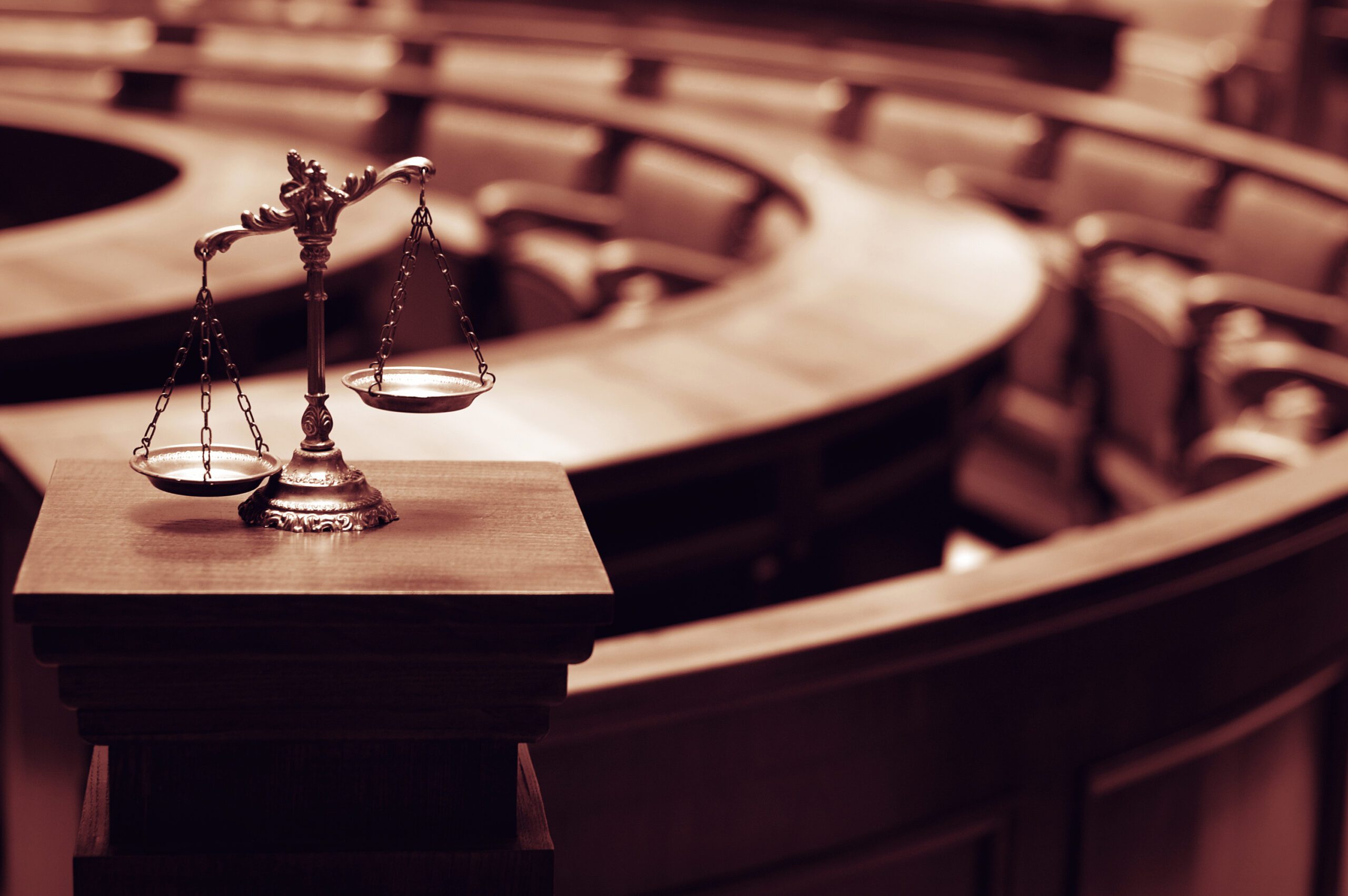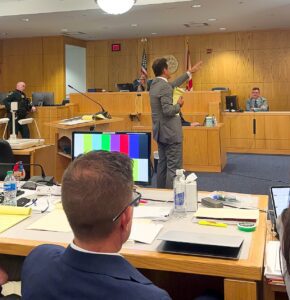 What happens after a large jury verdict? There’s always an appellate process that usually takes place. There are motions that happen immediately following the verdict. They ask the trial court judge first to reduce, usually. They ask the trial court judge to grant a new trial, usually right after the verdict.
What happens after a large jury verdict? There’s always an appellate process that usually takes place. There are motions that happen immediately following the verdict. They ask the trial court judge first to reduce, usually. They ask the trial court judge to grant a new trial, usually right after the verdict.
Notice Of Appeal
If that doesn’t work, they then have so many days to file a notice of appeal. The Notice of Appeal goes to a court, an appellate court in Tallahassee, the first DCA, the first District Court of Appeals for Florida, and that first DCA is the first layer of appeals in the state court. on the court, and of course there will be appellate issues, usually when there are large verdicts like that, which can take six months or even years.
Recent Large Verdict For Zarzaur Law, P.A.
 How does the appellate process come into play after a large verdict, just like the most recent large jury verdict Zarzaur Law, PA, won? The $16,000,000 verdict included $6,000,000 in compensatory damages and $10,000,000 in punitive damages for the surviving spouse and children of a victim of medical malpractice / wrongful death.
How does the appellate process come into play after a large verdict, just like the most recent large jury verdict Zarzaur Law, PA, won? The $16,000,000 verdict included $6,000,000 in compensatory damages and $10,000,000 in punitive damages for the surviving spouse and children of a victim of medical malpractice / wrongful death.
A dissatisfied party may appeal the judgment by filing a notice of appeal with the clerk of the district court. The notice of appeal must be filed within 30 days of entry of the judgment (or 60 days of entry of the judgment if the United States or any of its agencies or agency heads is a party).
From 4dca.flcourts.gov – Civil Appeals
A civil appeal is brought to review a matter arising from a civil case. The most common form of review is by appeal of a final order of a circuit court — the final judgment or order that decides the merits of the case — who wins or loses. The district court can also hear appeals from certain limited orders that the circuit court enters before the final judgment. These orders are listed in Florida Rule of Appellate Procedure 9.130(a). Civil non-final orders other than those specifically listed in Rule 9.130 are not reviewable unless the order qualifies under the strict standards of the appellate court’s discretionary extraordinary writ jurisdiction such as certiorari, mandamus or prohibition, or are appealable orders under Florida Rule of Appellate Procedure 9.170 in probate and guardianship cases. Certain orders of the circuit courts, acting in their review capacity, as well as certain orders certified from the county courts, may also be appealed to the district court. Finally, administrative actions may be appealed as provided by general law.
If the appeals process plays out, it usually stops at the first DCA level. It either comes back for some problem with the verdict or initial trial or it gets affirmed, which means the appellate court says everything was okay and the case can always settle while the appeal is pending.
The Bargaining Position
So it’s hard to say what’s going to happen in this particular case, but it’s certainly one of those ones that’s going to likely go through the appellate process some time before there’s a resolution anyway. It’s a good position to be in as a plaintiff, right? Because you start off in a very good bargaining position when you have a $16 million dollar judgment against a company or a defendant.
The Verdict Is Not The End Of The Road
You, as a plaintiff, should just understand that if you end up with a big jury verdict, that’s not the end of the road. That’s probably midway. It just puts you in a very, very good bargaining position. So when you’re picking lawyers, you want somebody who can put you in that bargaining position.
A lawyer who has tried lawsuits and gotten multimillion-dollar verdicts and is board-certified is best suited to put you in that position. Keep in mind that only about 1 percent of these cases go to trial. Our percentage is higher than that because we don’t settle cases for less than what they’re worth.
FLORIDA APPEALS FAQ
Frequently Asked Questions
you need answers to before you file a civil appeal in Florida
1. What is an appeal
An appeal is a legal process designed to review decisions made by a trial court or lower tribunal to determine if a harmful legal error occurred that affected the outcome of the case. It is a right guaranteed in the Florida Constitution and the U.S. Constitution for any party to a civil court case. (There are criminal appeals, too, but we do not address those here.) An appeal is not an opportunity to reargue the facts of a case or to reargue credibility of witnesses. There must be legal error, and that error must have been prejudicial to your case.
2. Do I have to be represented by a lawyer?
No, you don’t. Anyone can represent themselves if they choose. However, the appeals process is very complicated and it is wise to secure the services of an experienced attorney who specializes in appellate law. Anyone who does not properly follow the rules of appellate procedure could have their case dismissed without being considered.
3. How do you start an appeal?
In most instances, a Notice of Appeal is filed with the Clerk of the Court where the original case was decided. There is a strict deadline, usually 30 days. If you miss it, your case cannot be reviewed. That’s why timing is critical if you wish to appeal your case. There are state-levied filing fees that must be paid when the appeal is filed. There are also other fees to obtain a record of the proceedings in the trial court.
4. What are the steps in the process to appeal my case?
There are multiple steps in appealing a case. A mistake at any point could endanger your appeal. That is why it is so important to retain an experienced appeals attorney to handle your case. A record of your case must be obtained, and usually a transcript of the earlier proceeding must be secured, A brief is written to make the legal arguments about why the trial court’s decision was wrong as a matter of law.
Or, if a decision in your favor is being appealed by another party, a written argument is made why the trial court’s decision was correct and should not be reversed.
There are very strict rules about how a brief must be formatted and what it is to contain.
Oral argument is permitted only in selected cases.
5. How do I know if I can appeal my case?
There are certain requirements for a case to be appealed. Briefly, there must have been a legal and prejudicial error in the trial court. It could be an error of procedure, an error in the evidence, or an error in the application of the law. In any event, it must have affected the outcome of the trial. Also, the error must have been “preserved” by an objection in the trial court. An appellate attorney can help evaluate whether the requirements are met for an appeal. The District Court of Appeals will determine whether an error in the trial court was harmful to the outcome of your case.
6. Can my case be dismissed?
Yes. An appellate court might determine that the original court order cannot be appealed. In that event, the case would be dismissed. Dismissal could be based on the fact that the order you are appealing is not a “final” order, and it not appealable. Or your appeal was not filed “timely.”
7. How long does an appeals process take?
Given all the steps involved, an appeals process can be quite long, perhaps months. Patience is a virtue. Your appeals attorney will keep you up-to-date and will be your advocate throughout the procedure.
8. Who makes the decision in the case of an appeal?
Generally, your case will be decided by a three-judge panel at the District Court of Appeal. The panel will review the briefs and the record and conduct research as well. A decision based on the issues raised may be written and distributed to the parties involved.
9. What are the possible outcomes of my case?
The court could affirm the lower court’s ruling. In that instance, the original ruling of the lower court will remain in effect. The appeals court also could reverse the ruling of the lower court if it finds that the lower court’s decision was in error. It also could reverse and remand the case to the lower court for further action. The appeals court could find that the errors presented were not harmful to the case and did not affect the final decision. In that event, the lower court’s ruling would remain in effect.
10. What happens if I lose in the appeals court?
In some situations, if it appears that the appeals court has misunderstood or overlooked the law or the facts in the case, you may file for a rehearing. This is not an opportunity to argue the case again. In very rare instances, your case might be appealed to the Florida Supreme Court or the Supreme Court of the United States. This is a matter best discussed with your appellate attorney.
WATCH THE PLAINTIFF CLOSING ARGUMENT ON OUR YOUTUBE CHANNEL! >
LISTEN TO JOE’S RADIO INTERVIEW >
WATCH JOE’S YOUTUBE VIDEO ON THIS TOPIC >
It is always important to consult with a Board-Certified Civil Trial lawyer who has the knowledge and experience to help you. The team at Zarzaur Law, P.A., knows accidents caused by another person’s or entity’s carelessness can be stressful and wants to make the process as easy as possible. You need an experienced personal injury attorney who can fight for you to get the compensation you are entitled to. Call Zarzaur Law, P.A., today at (855) Hire-Joe or visit www.zarzaurlaw.com for more information.
Sources: